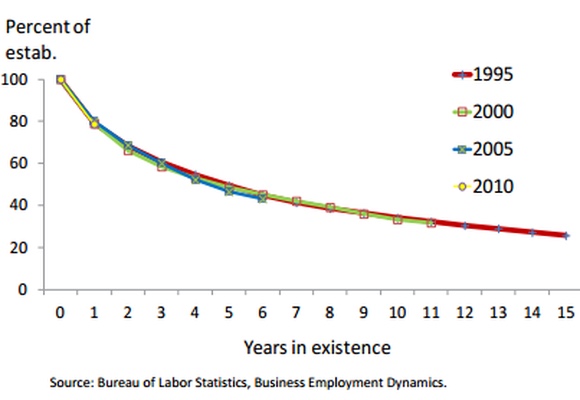What We’re Reading
Here are a few good articles the Collaborative Fund team came across this week.
Long shots
One of our favorite VC articles in a while:
The longer I’m in venture capital, the more I’m convinced that the art of VC is about knowing when to seem crazy. I’d wager that the majority of multi-billion dollar companies started with an investment that looked crazy from the outside.
Geography
Naval Ravikant on the distribution of promising startups:
“Venture capitalists like to say there’s only a few good new companies every year. I looked at my physics textbook but couldn’t find that law of nature,” he said. “The idea that innovation is limited to small number of people who gather in Silicon Valley is ludicrous. … The number of startups is only limited by human ingenuity and the market’s ability to absorb them.”
Dragging on
This is a smart observation on why starting a business can be so exhausting:
Many businesses do not fail fast– rather they just never really succeed:
Help
The winners, be they CEOs, senators or Nobel laureates, owe much of their success to a functional system. I’m not the first to note that Steve Jobs likely would have been a subsistence farmer if he had been born in another time (if he survived childhood at all). Yet his achievements tend to be portrayed as entirely his own.
In short, we over-reward those at the top and dismiss the rest. It’s an unhelpful and unnecessary bias that facilitates hero worship, undermines the goal of nurturing creativity and discourages valuable contributions to communities, worthy causes and scientific projects.
Education
Shifting perspectives:
14 percent of hires at Google have no college degree, according to the company’s senior human-resources officer. Nearly half of Americans surveyed last year by Public Agenda — a nonpartisan policy organization that focuses on education and other topics — said a higher education is no longer necessarily a good investment. And about the same proportion of graduates in aGallup poll released last year said they were less than certain their degrees were worth the money.
Insurance
Nevada may be becoming a template for something closer to single-payer.
The Nevada legislature passed a bill Friday that would allow anyone to buy into Medicaid, the public program that covers low-income Americans. It would be the first state to open the government-run program to all residents, regardless of their income or health status.
Have a good weekend.
